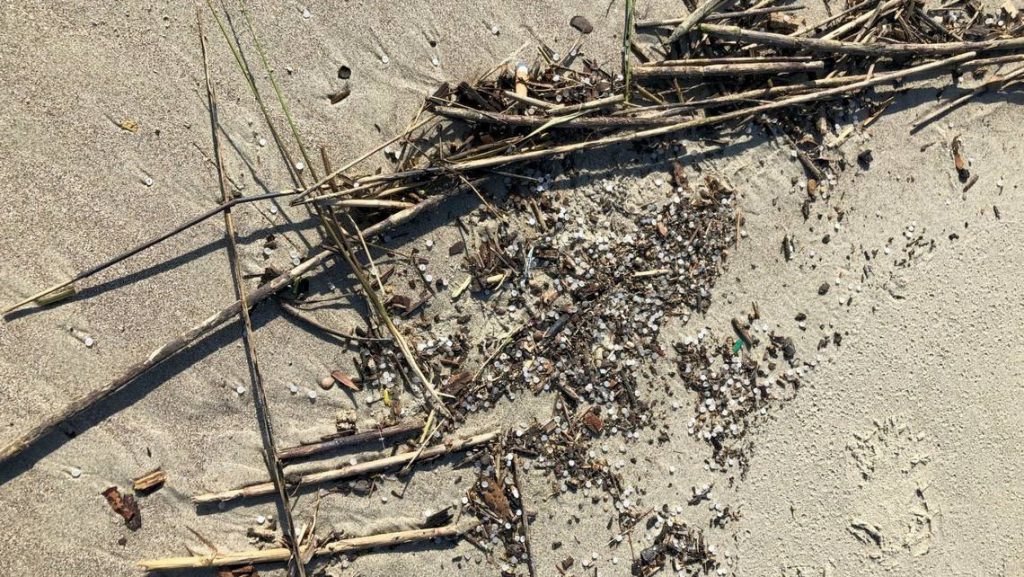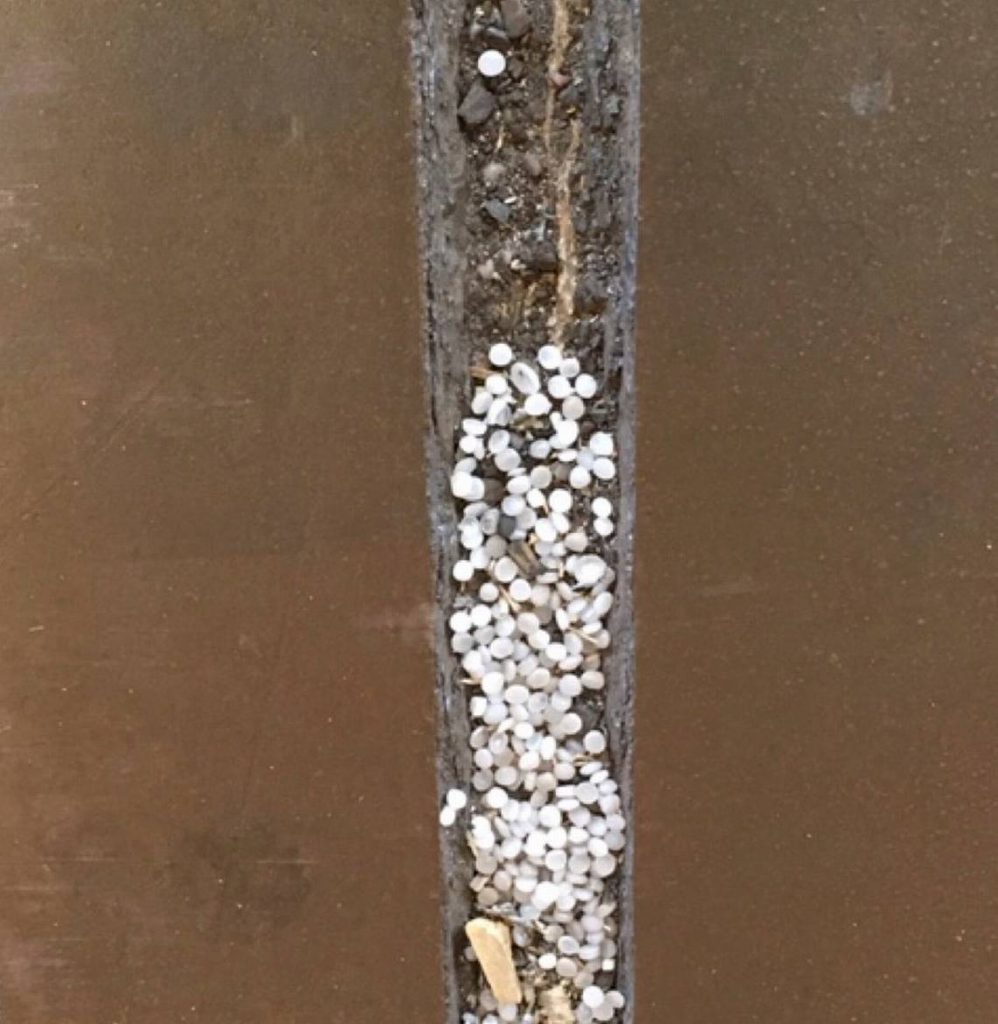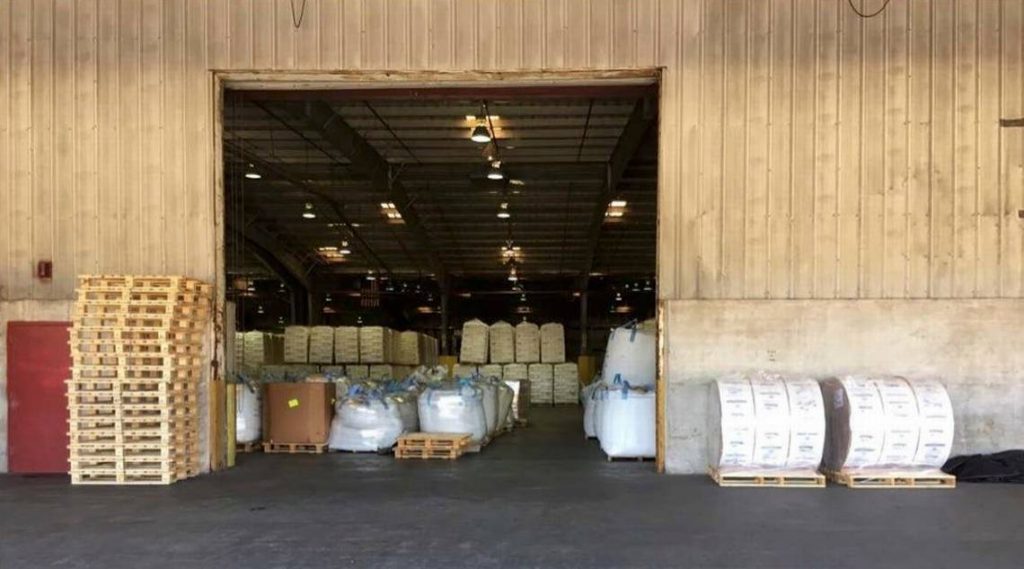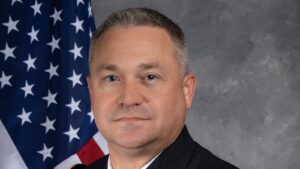
Photo: Nurdles were found along this Charleston area beach by inspectors
As seen in The State, by Chiara Eisner
This video includes an interview with John Weinstein, Ph.D., head of the Biology Department at The Citadel
The last thing Cecile Fletcher wanted to think about on a recent beach run around Sullivan’s Island, her family’s home for more than a decade, was plastic waste. But when she bumped into a friend who was sitting on the water’s edge with her toddlers and crouched down to join the group, Fletcher said she saw milky, white plastic pellets embedded everywhere in the reeds.
“There were too many for me to even begin to pick up,” she remembered.
Fletcher isn’t the only one who’s noticed the pebble-sized plastic balls, called “nurdles,” along South Carolina’s coast. Upon receiving a complaint about them on the island last July, the S.C. Department of Health and Environmental Control (DHEC) conducted an inspection at the facilities of a company that packages and ships the nurdles from a nearby pier at the Port of Charleston. The agency found “numerous areas of concern” and alleged the company, called Frontier Logistics, had violated the Pollution Control Act.
But DHEC closed the case without issuing a penalty in October, “after evaluating the multiple steps the facility had taken to prevent future spills,” an agency spokeswoman told The State Media Co. Since then, the Charleston Waterkeeper has tracked down nurdles along swaths of South Carolina’s coast, following scientific guidelines for surveying them. The nonprofit has consistently found the highest concentrations closest to Frontier’s facility, and has collected more than 17,000 of the nurdles as far north as the Cape Romain National Wildlife Refuge near Awendaw, S.C., and as far south as Edisto Beach in Colleton County. That amount is just a sliver of the actual number in the waterways, clarified Andrew Wunderley, executive director of the Waterkeeper, since it represents only the nurdles picked up by a single person for a few minutes at a time.
Because it believes neither Frontier nor any enforcement agency has taken effective steps to stop the pollution, this March, the Southern Environmental Law Center filed a lawsuit against the company on behalf of the Waterkeeper and the S.C. Coastal Conservation League.
Frontier has denied the claims, saying it is being unfairly targeted as the source of the pollution.
Last week, the judge presiding over the case rejected each of Frontier’s arguments opposing the suit, allowing it to continue. He also ordered the S.C. Ports Authority (SPA), a quasi-public state agency that owns and operates the port and whose board is appointed by the governor, to comply with a subpoena to provide information about Frontier to the nonprofits. The agency had previously tried to quash the request.
Now, never-before-seen documents reviewed by The State Media Co. — reported here for the first time — reveal leadership at the Ports Authority has been helping shield Frontier and its business supplier from scrutiny despite internally noting that the company was responsible for spills. And in emails exchanged in private, leaders of both organizations sometimes seemed to dismiss ecological concerns or public accountability, the documents show.
The information in the documents has implications that reach far beyond the coast. South Carolina has invested at least $2 billion over the past decade into modernizing its ports to attract companies just like Frontier — whose nurdles are made by Chevron Phillips Chemical, a multi-national petrochemical company. The agency said that investment has led to hundreds of thousands of jobs for South Carolinians and tens of billions more in economic impact.
“Our mission as a port is to grow more and more commerce, and that’s what the state charges us to do,” said Jim Newsome, president and CEO of the SCSPA.
Nurdles, often purchased to be melted down and transformed into other plastic items, are an important part of that pursuit. Newsome said the handful of companies that work with the pellets in Charleston exported around 10,000 containers of them from the port last year. He expects that number to grow to about 50,000 containers — or 1 million pounds of plastic — by around 2023.
But when pellets escape into the environment during the process of storing, packaging and shipping them, the pollution endangers not only the ecosystem but the state’s coastal tourism economy. Tourism brings in billions of its own in revenue. Last year, over seven million people visited the greater Charleston area, generating almost $10 billion in economic impact. Most visitors mentioned stopping by beaches or waterfront parks, a study by the Office of Tourism Analysis at the College of Charleston found.
The Frontier lawsuit may be telling for the incoming wave of plastics-focused shipments in S.C., and the ability of the state’s waterways to entice visitors in the future.
The CEO of Frontier, George Cook, declined to be interviewed for this article since he said the company “has a policy of limiting comment on pending litigation.” But in a letter Cook sent to DHEC in August of 2019, he outlined Frontier’s strategy regarding addressing the pollution violation it received from the agency last year.
“There are at least four companies in the Charleston area that do almost the exact same packaging business for the plastics industry that Frontier does,” Cook said, though Frontier is the only one that operates from a location so close to the ocean. “Since Frontier started operations at the Facility in April of 2017, Frontier has handled and packaged over 300 million pounds of plastic pellets with no reported spills.” The company “remains committed to full regulatory compliance and the goal of ‘Zero Pellets’ leaving its facility,” he wrote.
Newsome recently told the newspaper that he doesn’t know if the plastic pollution that DHEC linked to Frontier actually came from the company’s facilities, that there would be no way for him to know if it did and that he has “observed that they have maintained good procedures in handling the cargo on Union Pier.”
The hundreds of pages of documents reviewed by The State tell a different story.
“Environmental issue du jour”
Before DHEC reached out to the SPA on July 19, 2019, about plastic pellets on Sullivan’s Island, internal emails show Ports Authority officials were already aware of problems with spilling plastic from Frontier’s facilities.
That Friday, the permitting manager at the SPA sent an email to the authority’s Chief Operating Officer, Barbara Melvin, and a director that included photos of dozens of the nurdles strewn against a patch of leaves and twigs on the beach.
“I know we spoke in the past regarding Frontier’s management practices for keeping the plastic pellets out of our waterways,” the manager wrote. “My understanding is that they are supposed to be sweeping up their spills more often and putting up barricades to keep the pellets from washing away during rainfall … Please consider sending these photos to Frontier to reinforce the message that users of our waterways should be good stewards of our waterways.”
In an email the director then sent to Newsome and others two days later on Sunday, July 21, he said he had walked the entire perimeter of the Frontier operation and “identified four areas that physically could allow the pellets to enter the water as loading dock, rail tracks, expansion joints, and the drain grating.”
Hours later, Newsome emailed Frontier’s CEO, whom the documents show he considered a friend, with notes.
“Of all concerns, the most major one is getting the plastic out of the rip rap below the loading dock and providing a better barrier to keep future settlement of loose plastic from getting into the rip rap,” Newsome wrote, referring to the loose rock on the side of the pier.
He then seemed to suggest to Cook that Frontier’s local manager be crisp and responsive when communicating with DHEC for the sake of optics, since “there are lots of commercials of how plastics litter the oceans” and “plastics are the environmental issue du jour in South Carolina.”

But plastics are no passing fad for Dr. John Weinstein, Associate Dean and Department Head of Biology at The Citadel in Charleston. The harm they cause to marine ecosystems is his life’s work.
Most people think floating plastic takes decades or centuries to start to deteriorate, he said. Yet in research Weinstein conducted in 2016 along Charleston’s salt marshes, plastic started fragmenting within just four weeks — faster than he ever thought was possible. He thinks it might be happening so quickly in Charleston because at high tide in the salt marshes, plastics are readily exposed to sunlight, a primary factor in breaking down chemicals like the polyethylene in Frontier’s pellets.
As the larger plastic pieces become smaller particles, called microplastics, they become dangerous to even more animals, who often confuse the material for food. When shrimp in Charleston gorge themselves with microplastics, Weinstein realized in another study, real food takes at least 10 times as long to pass through their bodies. That has implications for development and basic nutrition, he said. Preliminary research has shown that microplastics, many of which contain substances that can cause cancer, have found their way into human organs, too.
Weinstein added that just because people may not have seen the plastic pellets around, it doesn’t mean they’re not there. Though clean-ups can collect the nurdles that wash up on some beaches, those efforts don’t do much for the pellets hiding in the rest of the waterways.
“If you think about all the salt marshes and tidal creeks connected to the harbor, with the tidal flow and tributaries, the tide could easily be carrying those pellets up those areas,” he said.
Fletcher confirmed this has been happening. She said she sees the nurdles all the time at high tide, and that the prolific balls have often left the beach and found their way into the yards of her neighbors. The best solution of the problem is prevention of the pollution in the first place, Weinstein indicated.
The same Sunday Newsome emailed him about the “environmental issue du jour,” Frontier’s CEO pledged to Newsome in an email that he would move towards the goal of prevention. He would see that dock and warehouse strategies for controlling escaping pellets from the facility would be immediately improved, Cook wrote, in order to avoid additional spillage from Frontier.

“We will be adding other measures to insure [sic] no area is subject to pellet migration,” he said. “This is not going to occur again regardless of weather conditions.”
The Ports Authority sent a cleaning crew to Sullivan’s Island that weekend to comb the beach for pellets that had escaped. But when a member of the press reached out to the agency the following Monday to ask why the clean-up was necessary and how it went, and Newsome passed the message on to Frontier, the CEO seemed to sneer at the reporter’s attempt to inform the public of what was happening.
“Always something. Thanks for the update. Now I’m sure we will be inundated with crazies from everywhere,” Cook wrote in an email to Newsome.
“We just have to make sure the new procedures are sound and implemented. Sometimes you just have to take your medicine, George,” Newsome returned. Then he offered to shield the manufacturer of Frontier’s polyethylene pellets, Chevron Phillips Chemical, from the press. “We will do our best to keep CP Chem’s name out of it,” he added.
“Please try to keep their name out of it,” Cook emailed back, along with a statement for the reporter that denied any knowledge of “where the recent issue originated from” and said the company was taking proactive steps to ensure no plastic migration.
Soon after, the Ports Authority would reach out to Chevron Phillips Chemical with a request of their own, the documents show.
“I sent some samples … of the nurdles I collected off the beach at Sullivan’s Island and Isle of Palms a couple of weeks ago. Do you have the results of the analysis of the samples and can you confirm that they are CPC’s product?” wrote the manager of risk and claims at the Ports Authority, in an email to an employee of the Polyethylene Warehousing and Packaging division at Chevron Phillips Chemical on August 12, 2019. “We have an extremely large invoice from the clean-up contractor that we hired and I would like to recover the cost from the responsible party.”
The documents reviewed by The State don’t show whether or not the testing confirmed the plastic pellets belonged to Frontier, and a representative for Chevron Phillips declined to provide the newspaper with the results of the analysis, citing the pending litigation and the company’s important relationship with the ports in South Carolina.
But a letter sent from the SPA two months later indicates the agency did arrive at a conclusion. On October 28, the manager of risks and claims presented an invoice to just one company for the full amount of the clean-up in July.
“Frontier Logistics is responsible for indemnifying the SCPA for the response and remediation cost incurred by the SCPA for the cleanup of certain material that escaped the SCPA’s facilities,” he wrote in the correspondence, which he sent to Frontier.
When The State first asked Newsome about whether the pellets had been tested by Chevron Phillips Chemical, he denied the port had done an analysis of the samples, and said if an analysis had been done, that it was not done through the port’s undertaking. After he was told a reporter at The State had reviewed documents that seemed to contradict his statements, Newsome replied through a spokeswoman that he stood by his comments and had nothing further to add.
Dana Beach, who founded the S.C. Coastal Conservation League and is one of the state’s most prominent conservationists, considered the port’s stance ironic.
“This is an industry with not only the potential, but the reality, of doing immense long-term damage to the ecosystem and adding to this global load of plastic pollution that is choking the ocean,’’ he said. “Yet the SPA, because it reflexively protects any customers they have, is defending them.’’

 Citadel professor published in the Smithsonian Magazine
Citadel professor published in the Smithsonian Magazine Citadel dean named to South Carolina Humanities board of directors
Citadel dean named to South Carolina Humanities board of directors Employee of The Citadel DoD Cyber Institute selected to be deputy commanding general of U.S. Army’s Cyber Center of Excellence
Employee of The Citadel DoD Cyber Institute selected to be deputy commanding general of U.S. Army’s Cyber Center of Excellence

